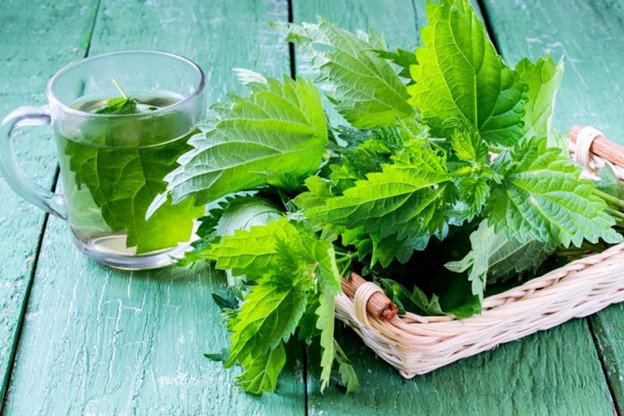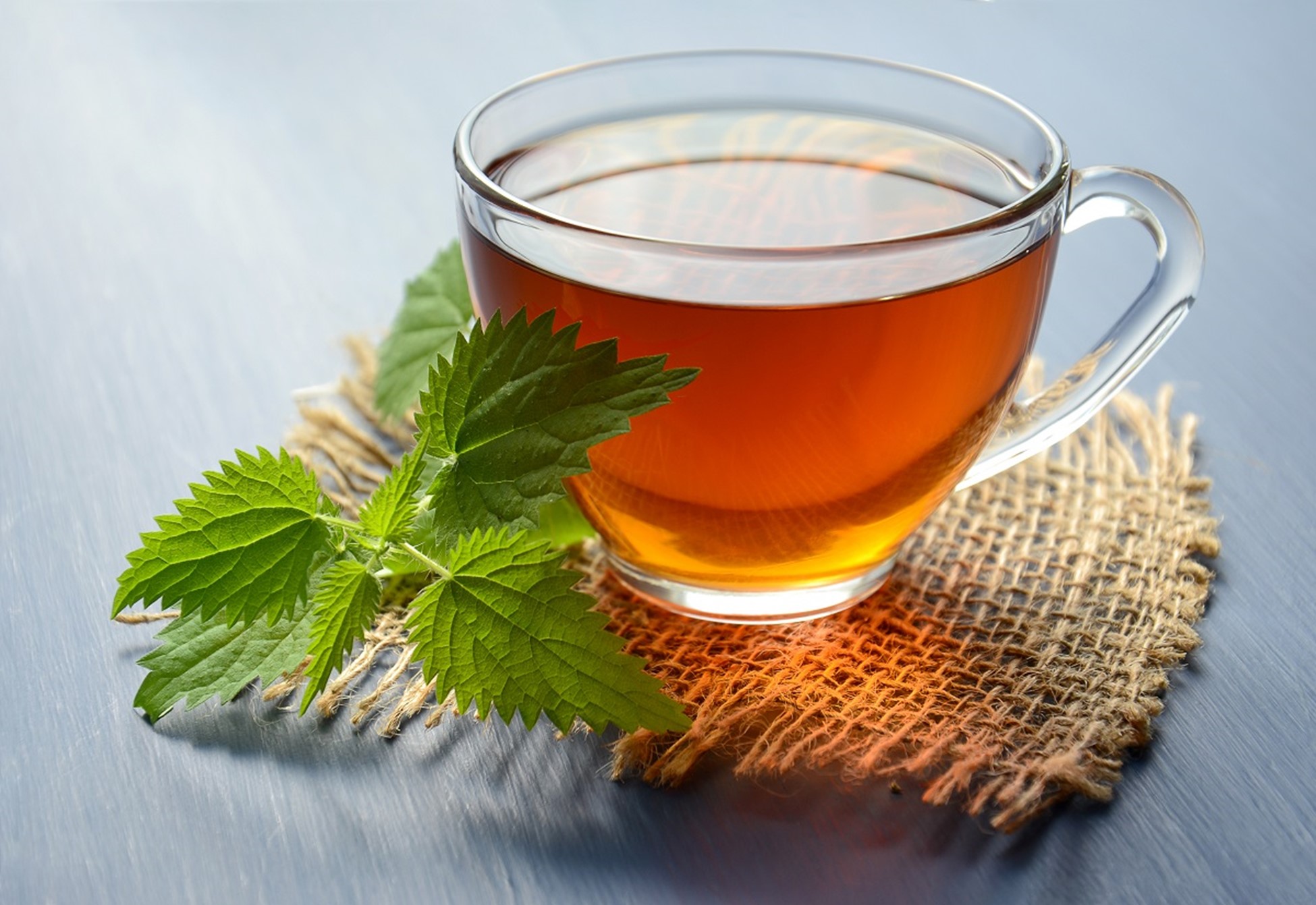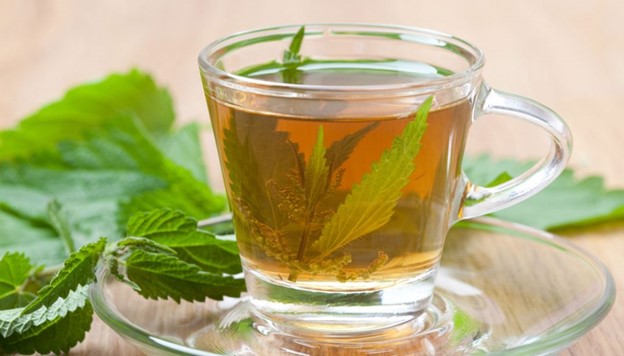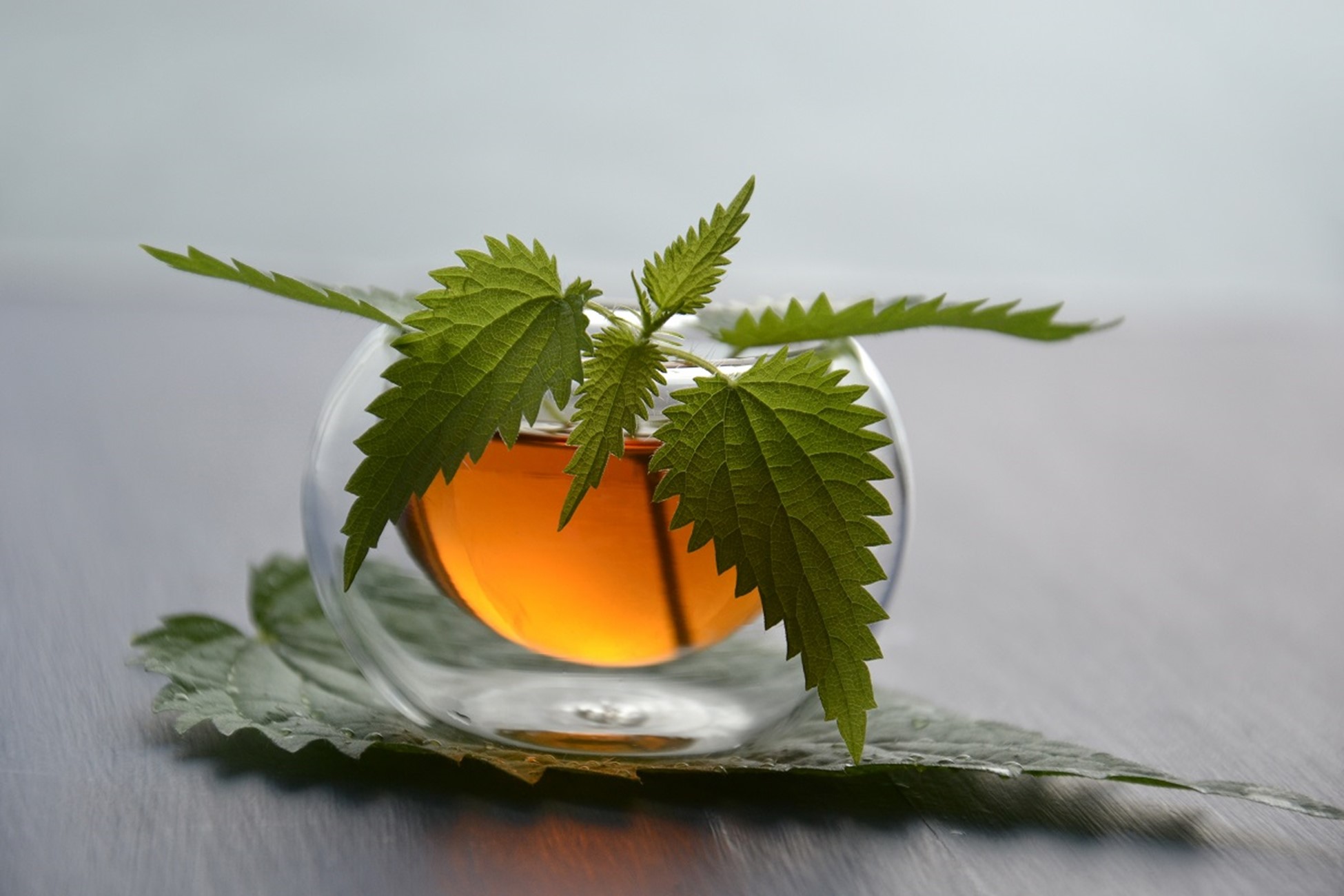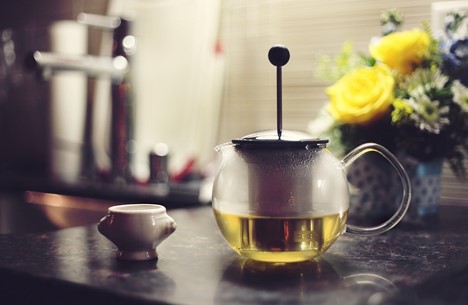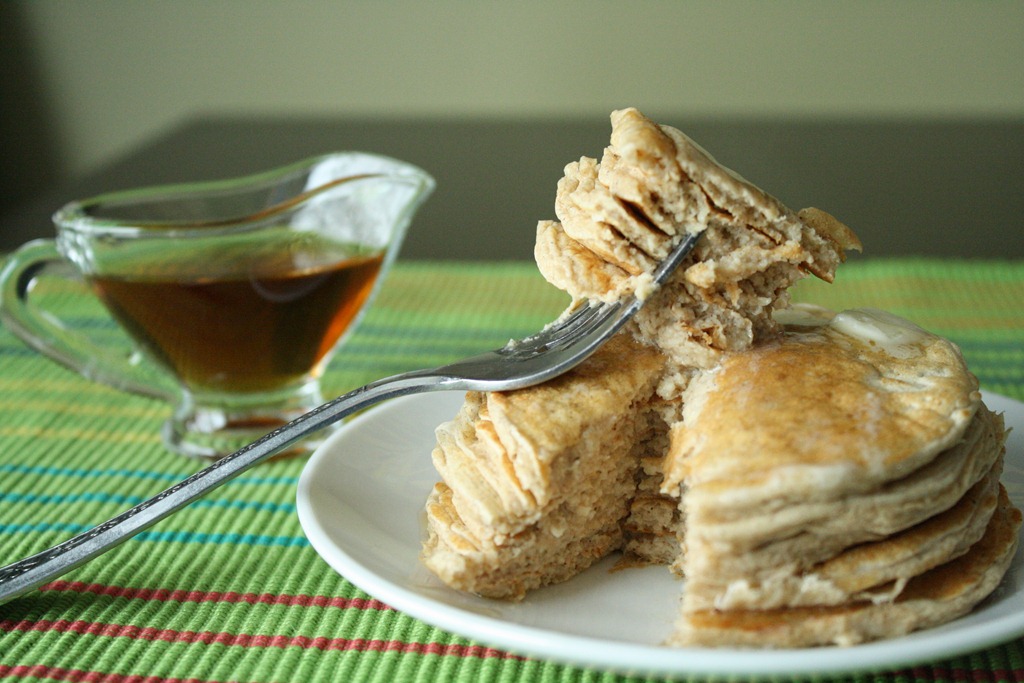Nettle is a very good medicinal plant for health. This plant is said to be “the great medicine of the Chinese emperors for 1000 diseases”. Nettle tea is an excellent remedy in the traditional medicine treatments, which heals almost anything: it detoxifies the kidneys and the whole body, reduces inflammatory processes in the body, improves digestion, naturally stimulates the lymphatic system, reduces hair loss, etc.
Find out in this article what are the main benefits and uses of nettle tea.
Summary
- Nettle tea – 22 health benefits
- Nettle – Other positive effects on the body
Nettle tea – 22 health benefits
Nettle has many healing properties, which is why it is widely used as a medicinal plant. For example, the plant has excellent bactericidal qualities, but also many:
- Vitamins (A, C, B1, B2, B3, K);
- Trace elements (iron, phosphorus, magnesium, manganese, potassium, copper, calcium, silicon);
- Palmitic acid, oleic acid, linolenic acid, stearic acid;
- Antioxidants, lutein and beta-carotene.
Here are the main uses and benefits of nettle tea:
- Improves digestion
The nettle activates metabolism, improves digestive processes, lowers blood sugar and repairs the intestinal mucosa. Nettle tea has hemostatic, tonic and diuretic effect.
This plant it has been said to have a small amount of creatine – a hormone that stimulates the secretion of pancreatic juice and improves stomach motility. Nettle has good digestive activity, it also helps in more efficient assimilation of nutrients from food.
Nettle is an excellent plant for weight loss.
- Prevents the formation of kidney stones
Nettle tea has good diuretic effect and helps prevent kidney stones from forming. Tea can be prepared from fresh leaves, or from dried nettle leaves.
According to a study conducted by researchers, 500 ml of nettle tea contains 76 mg of magnesium, so 20% of the daily requirement of this nutrient.
Nettle tea has a good effect on the kidneys and bladder, has anti-inflammatory, antioxidant properties, helps in fighting infections and toxins in the urinary tract.
- Helps to cure eczema
The nettle can be used for external use in the treatment of eczema and other chronic conditions and diseases of the skin. It has antibacterial and emollient effect, it heals wounds, it regenerates the skin. It can also be used in the acne and alopecia treatment.
This plant has fatty acids (linoleic acid, oleic acid) that stimulate healing, regeneration of the liver. It has detoxifying effect for the body, it is consumed in the spring season.
The plant helps to purify the blood, normalizes the level of hemoglobin in the blood, increases the volume of red blood cells, prevents anemia and diseases of the circulatory system.
Nettle juice is ideal for spring detoxification.
- Wound healing
The nettle has the ability to treat wounds, acne, warts, itching of the skin and other skin conditions. Nettle leaves tea or infusion applied as a compress are recommended.
The plant has a hemostatic, healing effect, makes it possible to heal internal bleeding, speeds up wound healing.
If an insect has stung you, you can apply a nettle tea compress to the affected area to relieve the symptoms. This treatment also helps in cases of minor burns.
- Relieves asthma attacks
Dried nettle leaves can be a good remedy in cases of asthma, allergies, rhinitis, hay fever.
- Treats muscles and joints
Rich in silicon and other trace elements, the nettle maintains the bone health. It can be used in tea or in combination with oats and horsetail to help calm the nervous system. Through its calcium and mineral content, the nettle maintains bone density and relieves joint pain.
Nettle tea is used in cases of anemia, arthritis, joint and muscular rheumatism, atherosclerosis and other diseases. The plant is a powerful anti-inflammatory agent, which is why the tea in its leaves is effective in arthritis cases. Herbal tea acts as a natural soothing, contains certain substances that can relieve muscle and joint pain.
The anti-inflammatory properties of nettle tea are useful for combating inflammatory processes that affect the muscle, bone and joint system. Compresses with nettle tea are recommended in areas affected by inflammation and pain.
Tea from nettle leaves relieves rheumatic pain.
- Treats diarrhea
Nettle tea cures diarrhea and relieves stomach pain. The plant has astringent effect and contains tannins, which is why it can treat diarrhea, dysentery, colitis. It has been shown to have analgesic effect, so a glass of nettle tea is a good remedy for belly pain. It has a good effect in combating headaches and other body aches.
The nettle heals the gastric mucosa, can help in cases of stomach irritation, heartburn, ulcers, pain and abdominal discomfort. People who will use nettle tea or infusion will immediately notice the calming effect created by this natural preparation.
- Abundant menstruation and hemorrhoids
The nettle has hemostatic, tonic and astringent properties, so it can help in cases of nose bleeding and other conditions: minor internal bleeding, hemorrhoids, heavy menstruation, diarrhea.
The nettle leaves are very good for hormonal balance, they are an excellent remedy for the female reproductive system. It has been said that they can increase egg production because they support the hormone that stimulates the follicles.
Nettle tea removes toxic estrogens coming from pesticides and plastics.
The adrenal glands produce 3 hormones: estrogen, testosterone and progesterone. When a hormone deficiency occurs, doctors say that the adrenal glands are depleted or overactive. In such cases, the nettle leaves are a real help, which have a good effect on the revitalization of the adrenal glands and on the overloaded and depleted endocrine system.
Nettle tea is a means of increasing milk secretion during breastfeeding in women.
- Increases muscle mass
The researchers said that the nettle can detoxify the body, improve metabolism and increase muscle mass. Therefore, those who want a development of the muscular system and a strength increase can drink nettle tea.
There are also supplements for athletes that contain nettle and offer benefits for athletic performance: increased strength and muscle mass, but also increased testosterone levels.
- Fights anemia
The nettle is rich in vitamins and trace elements, it has iron and calcium, which is why it helps in fighting anemia. In general, women are prone to anemia, especially during the menstrual cycle. Doctors recommend women drink nettle tea to prevent iron deficiency.
- Controls blood pressure and blood sugar level
Nettle tea lowers blood pressure, which is a great benefit to people’s health since high blood pressure can be very dangerous, can lead to heart attack and stroke.
- Helps in cases of hay fever
The pollen season is approaching and it is very difficult to bear by certain sensitive people, who suffer from hay fever. These may have symptoms of nose itching, eye tears, sneezing when they go out.
Doctors recommend an antihistamine treatment that can relieve these symptoms, but which can cause side effects – fatigue and drowsiness. An effective alternative to this treatment is nettle tea, which can alleviate seasonal allergies and hay fever.
- Urinary problems
Nettle tea is used in urinary system problems, it is recommended to combat fluid retention, interstitial cystitis and other diseases.
Nettle tea combats genitourinary disorders, prevents the development of prostate diseases.
Nettle leaves are effective in controlling worms and intestinal parasites. It has beneficial effect in relieving abdominal cramps, combating constipation, eliminating abdominal discomfort.
The best remedy against worms and intestinal parasites is: add a teaspoon of nettle to a cup of boiling water, boil for 15 minutes, strain, allow to cool and drink 3 times a day. Instead of leaves you can also use nettle root for this tea.
- It destroys germs in the oral cavity and prevents the formation of cavities
Nettle tea reduces gum and throat inflammation, kills germs in the mouth and prevents the development of caries or cavities.
- Lowers the risk of cancer
Nettle leaves are recommended in the following diseases: ovarian cancer, cervical cancer, reproductive tract cancer, uterine cancer, breast cancer.
The plant has been shown to fight prostate cancer cells and reduce the symptoms of benign prostatic hyperplasia.
The nettle is an excellent plant for sustaining the body in times of stress. Some say it is a powerful anti-inflammatory, which is why it has a beneficial effect on the organs of the human body.
Stress leads to chronic inflammation in the body and can worsen health. Researchers have associated inflammation with an increased risk of disease, such as diabetes, arthritis and cardiovascular disease.
Due to the natural polyphenols, the nettle fights the harmful effects of oxidative stress. The consumption of nettle tea prevents premature aging of the body and the development of chronic diseases.
Calcium and other trace elements in this plant help to restore nerves and reduce stress.
- Lowers the risk of heart attack
The nettle has a good effect on the activity of the cardiovascular system, improves the activity of the heart muscle, reduces cholesterol, lowers blood pressure and the risk of heart attack.
- Improves the eyesight and vision
Given the fact that we are spending hours in front of the computer and we are also exposing ourselves to pollution, we are no longer surprised that we have tired eyes. In the spring we can use the nettle as a remedy for internal use, as it improves memory and vision. In order to solve our vision problems we can consume nettle and parsley, these plants have a positive effect on the eyes.
For example you can consume scrambled nettle, mixed with green parsley and a little yogurt, three times a day for 30 days. Some say that this natural preparation has a good effect on vision.
Also, nettle tea, strained through the gauze, can be used as a compress on the eyelids. Has calming, anti-inflammatory effect, improves vision.
Remember, however, that rest is also important to maintain our eye health.
- It fights hair loss and stimulates hair growth
Nettle can be used in the spring to prevent and treat hair loss. Make a tea or infusion of nettle leaves as follows: boil the nettle (one tablespoon) in 250 ml water for 3 minutes over low heat, or leave the nettle to infuse for 20 minutes in hot water. Filter, leave to cool and drink one cup of tea a day.
The following remedy is recommended against hair loss: put 100 g of crushed nettle leaves in 0.5 liters of water and 0.5 liters of vinegar; boil this mixture for 30 minutes, allow to cool slightly and rinse the hair. The treatment is done 2-3 times a week.
The nettle it has been said that to also help in combating dandruff, thickening of hair, gives vitality, resistance and shine to the hair.
Nettle – Other positive effects on the body
Nettle also helps in:
- Normalization of glucose due to secretin from the leaves;
- Treatment of bronchopulmonary disease, as it has expectorant action;
- Reduction of menopause-related symptoms;
- Cold treatment and cough relief;
- Stimulating the appetite;
- Treatment for prostatitis;
- Nail strengthening;
- Treatment for post-traumatic stress syndrome;
- Combating strep throat infections;
- Treatment of anxiety and inflammation of all kinds;
- Combating sebum and toning hair;
- Prevention of chronic diseases.
The nettle is found on the edge of the forests, in gardens, islets, beside ditches, rivers or lakes, where it can be collected with gloves on the hands to prevent nettles. The nettle can also be bought from the market or bought from Kaufland. Nettle tea is found in the ceiling.
Here are the two varieties of nettle commonly found in the forest:
Scented nettle (Agastache foeniculum) or anise-nettle;
Forest homaloteca (Calamintha sylvatica), a plant called wild-forest-nettle.
